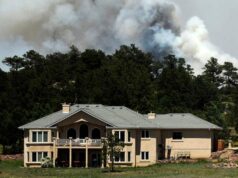
Last year, the climate movement found new vigor in a young Swede named Greta Thunberg. She began a solo strike and quickly caught global media attention for her sharp tongue and truth telling. Too often, however, her words have fallen on deaf ears as politicians continue to ignore the climate crisis. In one of her memorable speeches, she asked British parliamentarians whether her microphone was working. “Did you hear what I just said? Is my English OK? Is the microphone on? Because I’m beginning to wonder.”
Yet, Greta has become the face of a global movement of young people who are fed up with our leaders’ decades of failure to address the climate crisis. Her rise to prominence is charted in a new documentary, I Am Greta, released last week on Hulu.
The film follows her journey over a year, beginning with the iconic images of her sitting alone, outside the Swedish parliament, being scolded by strangers for missing school. It ends with her as a global phenomenon meeting with world leaders and crossing the ocean to attend a key United Nations meeting in New York. An estimated 4 million people took part in her weeklong strike in September 2019, myself included. It is a modern day epic, a hero’s quest that the filmmaker, Nathan Grossman, documents on an intimate scale.
I started working on climate change right around the time Greta was born, when I was the same age she is today. At the time, we believed that governments would act, and carbon emissions would fall. Instead I’ve watched the first atmospheric carbon concentration I memorized—375 parts per million—become out of date as we go past 415 ppm.
G/O Media may get a commission
We used to talk about kids like Greta’s generation, and how much this crisis would affect them. Working on my first climate campaign, we thought we could inspire parents to care about the world they were leaving their children. But that strategy largely failed.
Instead, it was the kids who woke up to the crisis. And they aren’t so young anymore. They’re teenagers, and they are angry at adults’ culpability. As an outspoken young activist with Asperger’s, Greta has emerged as an inspiration for an entire generation. By telling her story, Grossman is also capturing a growing global movement poised to reshape history.
The portrait Grossman paints is one not of the icon Greta has become, but of a teenage girl who has found herself unexpectedly influential—and is uncomfortable with all the attention. There are quiet moments with her dad where her stubbornness shows through and a scene where she tells French President Emmanuel Macron she is “a nerd” who loves reading about climate science.
This young woman is able to spin straw into gold. As attacks against her grow from the right, she sees it as a sign of her effectiveness. In the film, she is shown laughing hysterically at absurd social media comments from haters.
Early on, when she was just beginning to gain broader media attention, Arnold Schwarzenegger tweeted about her work. In the movie, she marvels at his 4 million followers and laughs with her father at the idea of reaching someone that famous. But, she quickly moves beyond being star struck, strategizing how best to reply: “Okay, I’ll write: ‘Count me in. Hasta la vista.’” Today, she has her own 4 million followers.
This fall, just after the election, President Donald Trump tweeted, “STOP THE COUNT.” Greta replied: “So ridiculous. Donald must work on his Anger Management problem, then go to a good old fashioned movie with a friend! Chill, Donald, Chill!” These were the exact words he had written about her a year later. And her tweet landed much better than the original. Like Rep. Alexandria Ocasio-Cortez—whom she has met—Greta’s quick wit works brilliantly online.
The Trump tweets are emblematic of the pressure on Greta, which is palpable throughout the film. She must speak in multiple languages to huge audiences, be away from home for months on end, and be attacked by old white men on television. At one point, Grossman captures Greta’s father, getting trained in emergency response, in case she is attacked. This is not paranoia; as the film points out, four climate activists are murdered every week.
And in a sense, the pressure on Greta stands in for the pressure being put on an entire generation. How else to describe being left to cope with a wounded world? With growing floods and fires, heat waves and hurricanes, life will not be as easy for Gen Z. If anything, as a young white person in the developed world, Greta will be more able to cope with climate disruption than her counterparts in the developing world—a fact she regularly points out.
But this is not a sad film. As anyone in the climate movement will tell you, there is joy in activism. As the movement she sparked begins to grow, Greta is delighted to find other people that share her struggle. The visual shift from Greta sitting alone, to her surrounded by thousands of young people is moving to watch, as are the clips of other young people, largely girls, leading protests on Fridays around the world.
In some of the more poetic moments, Greta is shown dancing. She raises her arms up and down, dips low, her braids swinging. Her movements carry a message: Make your life into a living act of resistance, make your life into art.
But it is also a haunting film to watch in 2020, a year after the narrative ends, in the midst of a global pandemic. The economic crisis has proven yet another missed opportunity for climate action. While people around the world called on leaders to pass a green stimulus, their voices have been largely ignored. According to an analysis by Nobel laureate Joseph Stiglitz and colleagues, as many stimulus policies were green as dirty. In the U.S., the covid-19 relief bill was used to bailout fossil fuel companies, to the tune of billions of dollars.
It’s telling that heads of state have been caught scrolling on their phones rather than listening to Greta’s speeches. Our leaders are not listening to her—or us or the increasingly urgent science.
At one point, Greta is standing on a train platform as a seemingly endless row of new gas-powered cars are carried by freight, to be sold and run for another couple decades. The metaphor could not be clearer: We are stuck on the same track. The world keeps churning out the same technology. It’s easy to feel hopeless.
But to borrow some of Greta’s words, change is coming, whether fossil fuel companies like it or not. Come January, the U.S. will have a new president in Joe Biden, who Greta endorsed. He ran on the boldest climate platform in American history and has centered climate action in his transition planning. Perhaps, our leaders have finally begun to hear Greta’s message. Perhaps, her microphone is finally working.
Leah C. Stokes is an assistant professor of political science at UC Santa Barbara. She is the author of Short Circuiting Policy, a contributor to All We Can Save and co-host of the podcast A Matter of Degrees.
Source: gizmodo.com








